Tirukural – Chapter 7
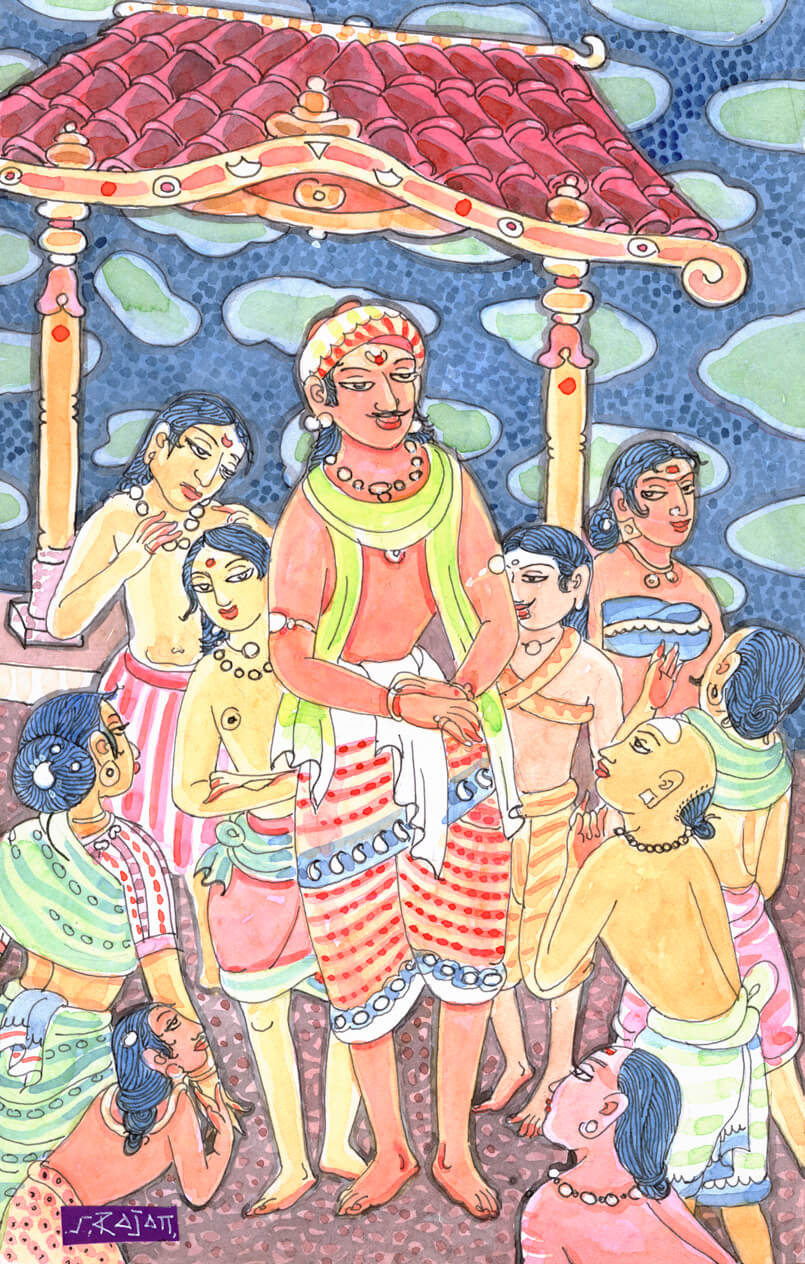
Chapter 7: The Blessing of Children

Verse 70
A proud father stands smilingly with his accomplished sons before a crowd. All are impressed by the sons’ closeness and humility.
You can access the entire text, in Tamil and English here:
Weaver’s Wisdom
Verse 61
Of all blessings we know of none greater than
the begetting of children endowed with intelligence.
Verse 62
Those who bear children of blameless character
will be untouched by evil for seven births.
Verse 63
It is said that children are a man’s real wealth,
and that this wealth is determined by his deeds.
Verse 64
Far sweeter than divine nectar is simple boiled rice
stirred by the small hands of one’s own child.
Verse 65
The touch of one’s children is a delight to the body,
and listening to them chatter is a joy to the ear.
Verse 66
“Sweet are the sounds of the flute and the lute,” say those
who have not heard the prattle of their own children.
Verse 67
A father benefits his son best by preparing him
to sit at the forefront of learned councils.
Verse 68
What pleasure it is to human beings everywhere
when their children possess knowledge surpassing their own!
Verse 69
When a mother hears her son heralded as a good and learned man,
her joy exceeds that of his joyous birth.
Verse 70
The son’s duty to his father is to make the world ask,
“By what great austerities did he merit such a son?”
Tirukural – Chapter 6
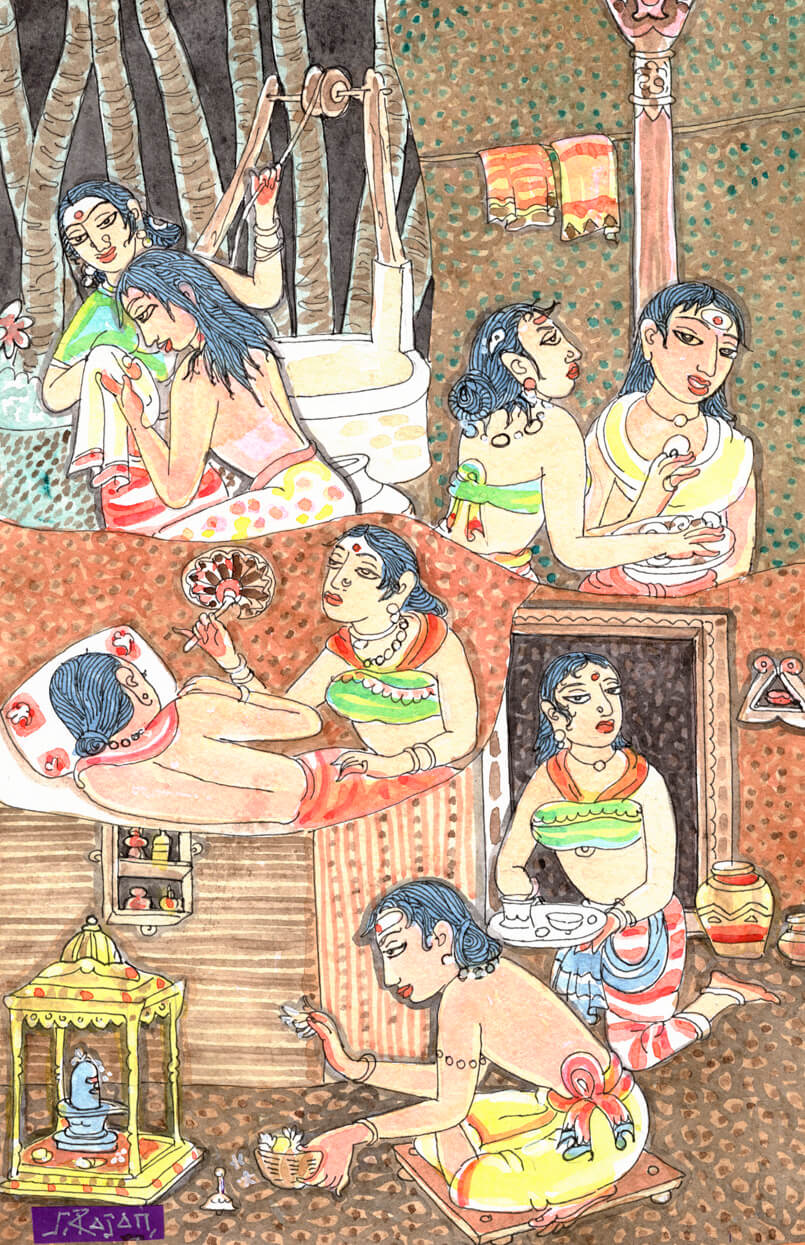
Chapter 6: The Good Wife

Verse 58
From morning to night the good wife is in constant service to her husband and family, washing, feeding, healing and assisting with the sacred daily puja.
You can access the entire text, in Tamil and English here:
Weaver’s Wisdom
Verse 51
She is the helpful wife who possesses the fullness of
domestic virtues and spends within her husband’s means.
Verse 52
Family life, however full, remains empty
if the wife lacks the lofty culture of the home.
Verse 53
What does a man lack if his wife is worthy?
And what does he possess if she is lacking worth?
Verse 54
What is more majestic than a woman
who preserves the prodigious strength of chastity?
Verse 55
Even the rains will fall at her command
who upon rising worships not God, but her husband.
Verse 56
A married woman is one who vigilantly guards herself,
cares for her husband and protects their unblemished reputation.
Verse 57
Why do guardians protect women by confinement
when her own resolute chastity is a woman’s best protection?
Verse 58
A woman deeply devoted to the man who wed her
will be worthy of great rewards in the world where Gods delight.
Verse 59
Unless the wife pursues praiseworthy purity,
the husband cannot stride before critics like a proud lion.
Verse 60
It is said a worthy wife is the blessing of a home,
and good children are its precious ornaments.
Tirukural – Chapter 5
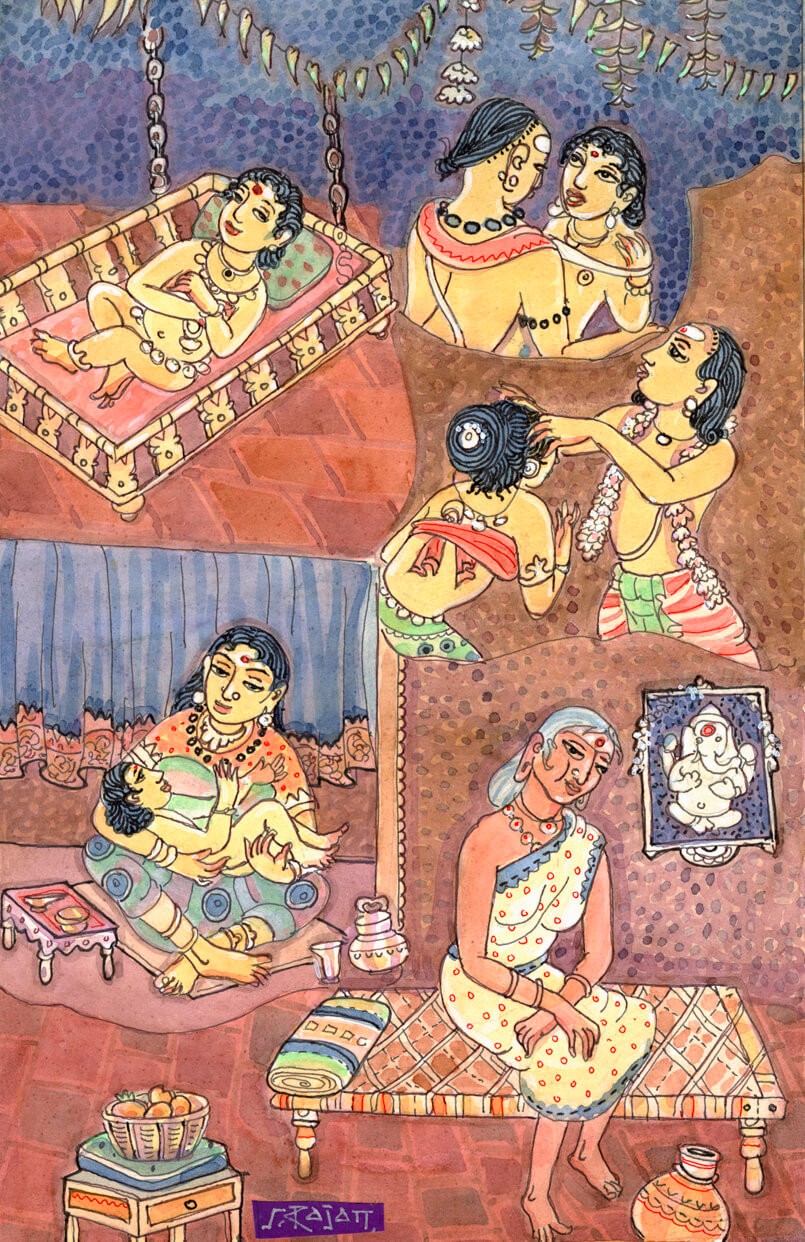
Section II: The Way of The Householder
Chapter 5: Family Life

Verse 47
Striving towards liberation in family life, different stages of life are shown: Namakarana samskara, childbirth, marriage, old age and Pranava Upadesha.
You can access the entire text, in Tamil and English here:
Weaver’s Wisdom
Verse 41
He alone may be called a householder who supports
students, elders and renunciates pursuing well their good paths.
Verse 42
The virtuous householder supports the needs
of renunciates, ancestors and the poor.
Verse 43
The foremost duty of family life is to serve duly these five:
God, guests, kindred, ancestors and oneself.
Verse 44
The posterity of householders who gather wealth without misdeeds
and share meals without miserliness will never perish.
Verse 45
When family life possesses love and virtue,
it has found both its essence and fruition.
Verse 46
If a man masters the duties of married life,
what further merits could monkhood offer him?
Verse 47
Among those who strive for liberation, the foremost are they
who live the blessed state of family life as it should be lived.
Verse 48
The householder dedicated to duty and to aiding
ascetics on their path of penance endures more than they do.
Verse 49
Domestic life is rightly called virtue. The monastic path,
rightly lived beyond blame, is likewise good.
Verse 50
He who rightly pursues the householder’s life here on Earth
will be rightfully placed among the Gods there in Heaven.
Tirukural – Chapter 4
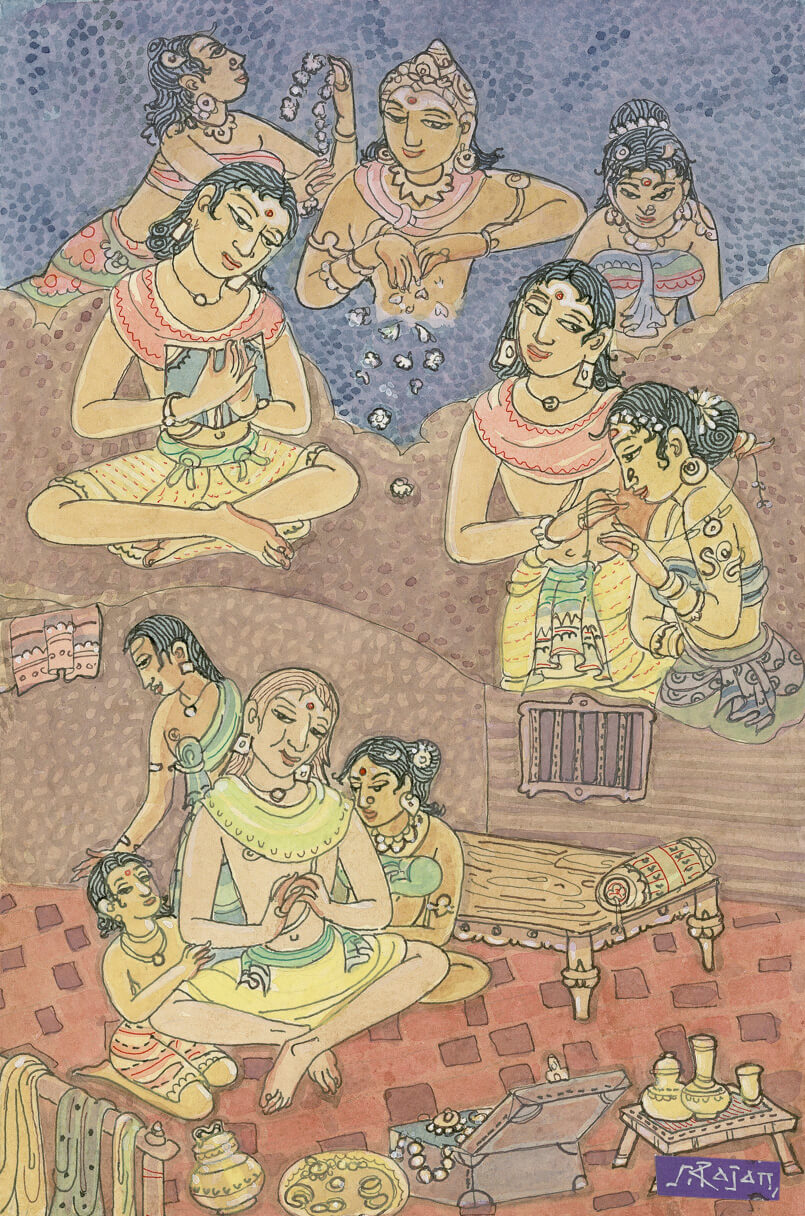
Chapter 4: Asserting Virtue’s Power

Verse 31
There are different virtues as we age from youth to adulthood to advanced age. The elderly woman is surrounded by family, the fruits of her virtuous life. Two devas shower flower petals from above to bless her virtue.
You can access the entire text, in Tamil and English here:
Weaver’s Wisdom
Verse 31
Virtue yields Heaven’s honor and Earth’s wealth.
What is there then that is more fruitful for a man?
Verse 32
There is nothing more rewarding than virtue,
nor anything more ruinous than its neglect.
Verse 33
Be unremitting in the doing of good deeds;
do them with all your might and by every possible means.
Verse 34
Keep the mind free of impurity. That alone is
the practice of virtue. All else is nothing but empty display.
Verse 35
Virtue is living in such a way that one does not fall
into these four: envy, anger, greed and unsavory speech.
Verse 36
Don’t tell yourself you’ll be wise enough to practice virtue tomorrow.
Do it now, for it will be your deathless companion when you die.
Verse 37
It is utterly superfluous to inquire about virtue’s benefits, so
evident in the difference between the palanquin’s rider and bearer.
Verse 38
Not allowing a day to pass without doing some good
is a boulder that will block your passage on the path to rebirth.
Verse 39
Only virtuous deeds abound in true joy.
All other deeds are empty and devoid of distinction.
Verse 40
Virtue is merely that which should be done in life,
and vice is merely that which should be avoided.
Tirukural – Chapter 3
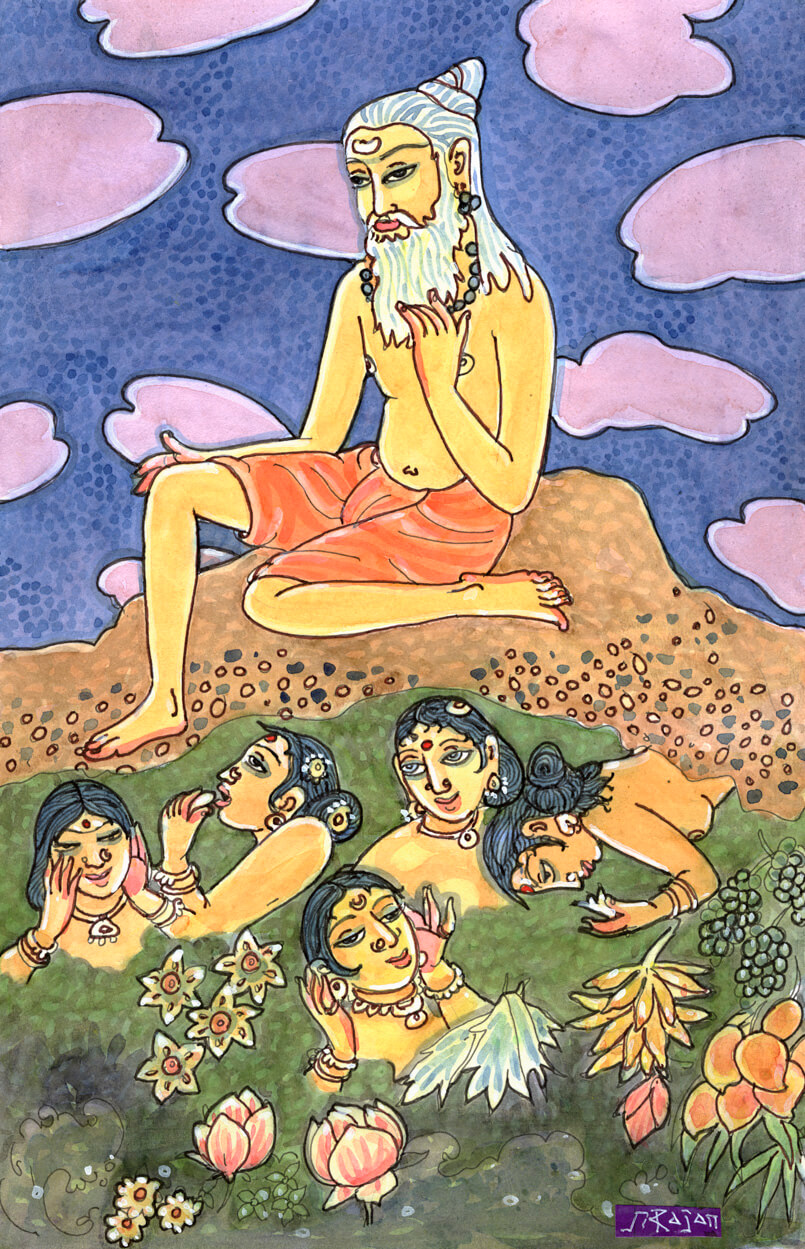
Chapter 3: The Greatness of Renunciates

Verse 27
A sadhu is seated on the mountaintop his right leg raised over a rock. The five senses of human consciousness are personified below him, senses he has perfectly controlled. Touch, taste, sight, smell and hearing.
You can access the entire text, in Tamil and English here:
Weaver’s Wisdom
Verse 21
The Scriptures exalt above every other good
the greatness of virtuous renunciates.
Verse 22
Attempting to speak of the renunciate’s magnitude is like
numbering all the human multitudes who have ever died.
Verse 23
Behold those who have weighed the dual nature of things and
followed the renunciate’s way. Their greatness illumines the world.
Verse 24
He whose firm will, wisdom’s goading hook, controls his five senses
is a seed that will flourish in the fields of Heaven.
Verse 25
Such is the power of those who subdue the five senses, that even Indra,
sovereign of spacious Heaven’s celestials, suffered their curse.
Verse 26
The magnificent ones are they who can dispatch the most
difficult tasks; the insignificant ones are they who cannot.
Verse 27
Touch, taste, sight, smell and hearing are the senses–
he who controls these five magically controls the world.
Verse 28
Their own subtle sayings reveal to the world
the greatness of men whose words prove prophetic.
Verse 29
It is impossible to endure, even for a second, the wrath of those
who have scaled and stand upon the mountain called virtue.
Verse 30
Pious men are called the priestly ones,
for they are clothed in robes of compassion for all life.
A Rarely-Seen Collection of Artwork Brought to Light!

In the 1990's, Himalayan Academy had commissioned initial series or art of the chapters of the Tirukural, the 2,200-year-old holy text written by the Tamil weaver Tiruvalluvar. That first series is what you'll find in the current publication. Upon seeing that collection of paintings for the first time in the early 2000s in South India, the late S. Rajam was compelled to write to the editors in Kauai. He urged us to give him permission and blessings to do another version of the entire collection, basically for free. With permission, in 2004 and 2005 he executed these intricate depictions of Tamil culture and philosophy. Perhaps someday a future edition of the book will hold these works. For now, you'll see them regularly published on TAKA along with their verses. Currently the pieces of art, with their individual captions, are available for you on HAMSA. You can always find it under the "Collections" menu as "Tirukural." Each piece of art is numbered according to its associated chapter in the book. Feel free to use these pieces in any of your personal projects. Enjoy!
Tirukural – Chapter 2
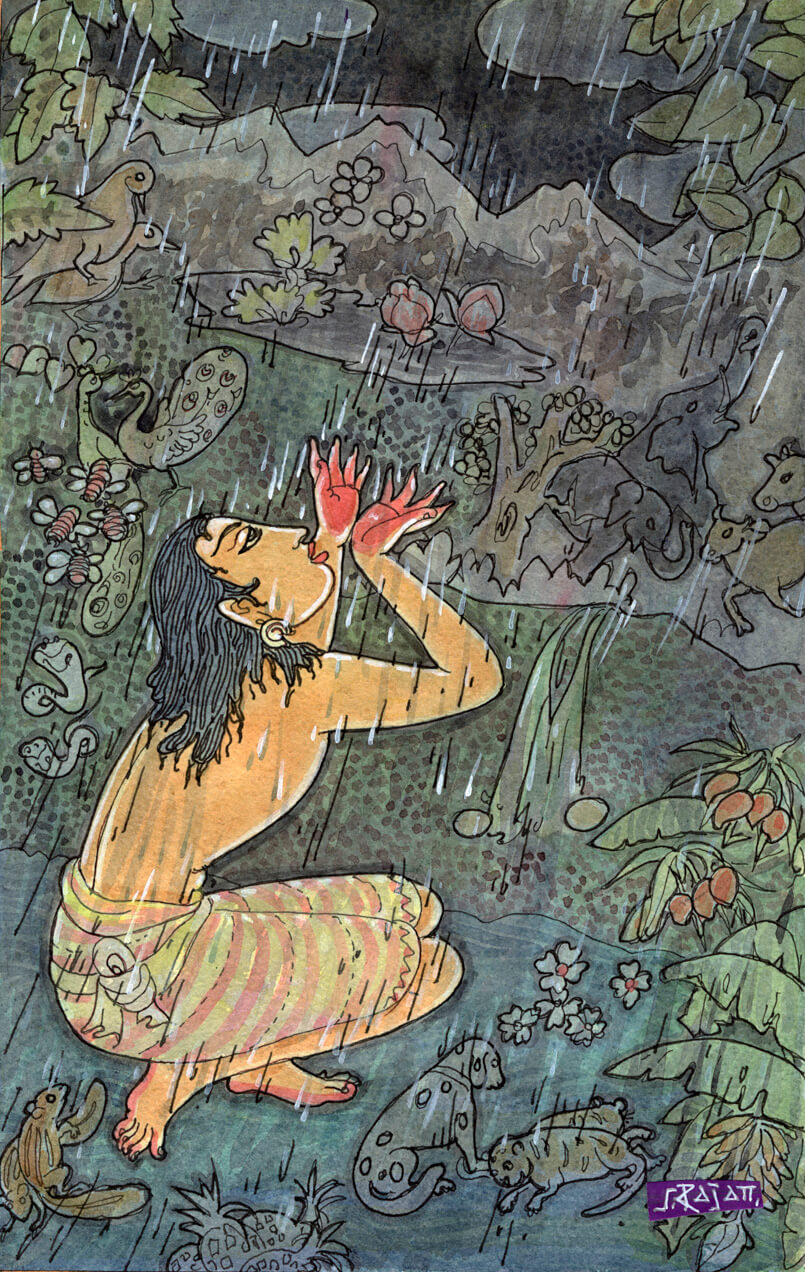
Chapter 2: The Importance of Rain

Verse 11
In a lush green rainforest of flowers and fruits, birds, bees and various animals, a man is sipping falling rainwater with his cupped hands.
You can access the entire text, in Tamil and English here:
Weaver's Wisdom
Verse 11
It is the unfailing fall of rain that sustains the world.
Therefore, look upon rain as the nectar of life.
Verse 12
Rain produces man's wholesome food;
and rain itself forms part of his food besides.
Verse 13
Though oceanic waters surround it, the world will be deluged
by hunger's hardships if the billowing clouds betray us.
Verse 14
When clouds withhold their watery wealth,
farmers cease to ply their plows.
Verse 15
It is rain that ruins, and it is rain again
that raises up those it has ruined.
Verse 16
Unless raindrops fall from the sky,
not a blade of green grass will rise from the earth.
Verse 17
The very nature of oceans, though vast, would diminish
if clouds ceased to take up water and replenish rain's gifts.
Verse 18
Should the heavens dry up, worship here of the heavenly ones
in festivals and daily rites would wither.
Verse 19
Unless the heavens grant their gifts, neither the giver's generosity
nor the ascetic's detachment will grace this wide world.
Verse 20
No life on Earth can exist without water,
and water's ceaseless flow cannot exist without rain.
Tirukural – Chapter 1
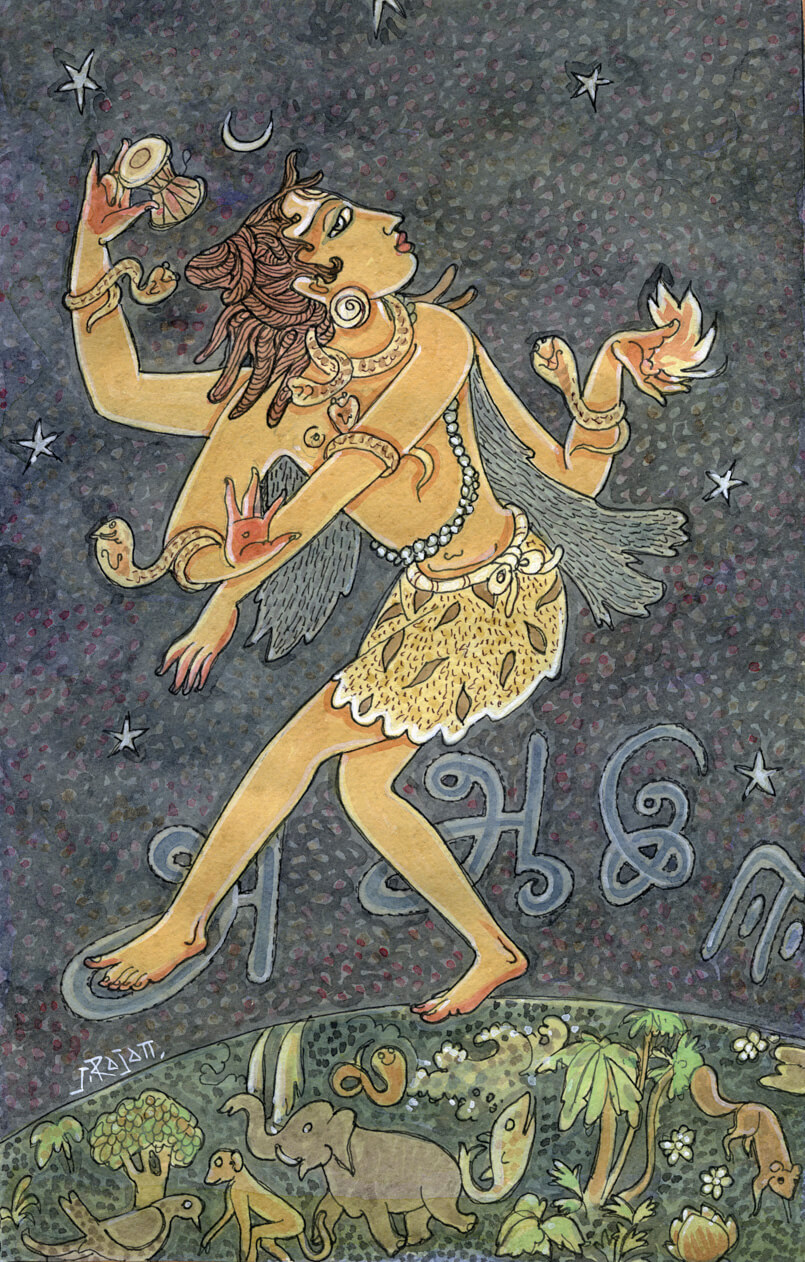
Part I: On Virtue
Section I: Prologue
Chapter 1: Praising God

Verse 1
The first four letters of the Tamil alphabet are seen here: A, AH, E, EE. This is the dancing Siva who creates. He is shown without ornamentation or man-made things. He is in all of nature, dressed with pearl necklace, simple cotton yarn sacred thread (poolnul. He is dancing over the world of birds, animals, plants and nature in her abundance.
You can access the entire text, in Tamil and English here:
Weaver's Wisdom
Verse 1
"A" is the first and source of all the letters. Even so is
God Primordial the first and source of all the world.
Verse 2
What has learning profited a man, if it has not led him
to worship the Good Feet of Him who is pure knowledge itself?
Verse 3
The Supreme dwells within the lotus of the heart. Those who reach
His Splendid Feet dwell enduringly within unearthly realms.
Verse 4
Draw near the Feet of Him who is free of desire
and aversion, and live forever free of suffering.
Verse 5
Good and bad, delusion's dual deeds, do not cling to those
who delight in praising the Immutable, Worshipful One.
Verse 6
A long and joyous life rewards those who remain firmly
on the faultless path of Him who controls the five senses.
Verse 7
They alone dispel the mind's distress
who take refuge at the Feet of the Incomparable One.
Verse 8
They alone can cross life's other oceans who take refuge
at the Feet of the Gracious One, Himself an Ocean of Virtue.
Verse 9
The head which cannot bow before the Feet of the Possessor of
eight infinite powers is like the senses lacking the power to perceive.
Verse 10
The boundless ocean of births can be crossed, indeed,
but not without intimate union with Infinity's Holy Feet.
An Upgrade to the Himalayan Academy Museum of Spiritual Art

Jai Ganesha!
Today we announce the release of an update to HAMSA, the Himalayan Academy Museum of Spiritual Art. For five decades the monks at Kauai's Hindu Monastery have been commissioning and collecting original works of art for our many publications, apps and web projects. Through HAMSA the entire collection is available to you.
See: https://himalayanacademy.com/hamsa/
Or navigate through the main menu by going to "Look & Listen" and selecting "Art & Paintings."
This update includes an entirely new interface and has clarified some of the organization of content. Also the site has been made more mobile-friendly. While there is a lot to look through now, we also plan to add even more artwork in the future. We will continue to apply data to existing pieces as well, adding captions and organizing more special collections. So stay tuned for even more to come!
Merging with Siva Audio Book in Gujarati
We are happy to announce the release of a new audio book: Merging with Siva in Gujarati!
Small red square is the key to the table of contents. Click on it. Read by Professor Harish Vyas Merging with Siva, Hinduism's Contemporary Metaphysics is a guide for one who is ready to diligently walk the spiritual path. Great new vistas open up throughout its 365 daily lessons as Gurudeva shares, in the clearest terms, deep metaphysical insights into the nature of God, soul and world, mind, emotions, ultimate realizations, chakras, purpose of life on earth and much, much more. Simple but effective practices are taught: how to remould our nature and karmas, calm the mind, develop self-esteem, begin to meditate, clear up the past and create a bright future. At the same time, the seeker is guided in establishing a regular devotional and yogic practice whereby the gains of his inner life and realizations are stabilized and used in practical ways.
From Our Gurus' Teachings
Archives are now available through 2001. Light colored days have no posts. 1998-2001 coming later.
